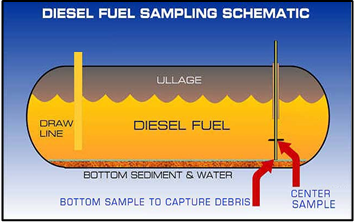Comprehensive testing identifies the need for purification, fortification of antioxidant additives and/or the addition of microbiological controls.
An awareness of the problems that can be associated with fuel oils, what testing is available to monitor them and knowledgeable recommendations for implementing preventive and/or corrective actions will increase the reliability, longevity and profitability of your equipment. Our comprehensive fuel analysis programs enable end users to:
- extend fuel filter life
- reduce engine deposits
- achieve safe, maximum oil service intervals
- anticipate problems
- implement a preventive fuel handling program

As diesel fuel ages, chemical oxidation creates particulate deposits or sediment. The rate of fuel degradation in extended storage is not predictable and varies by storage design, location, environmental issues, etc. Additionally, water buildup can corrode tank metals creating sludge, an ideal growth medium for microorganisms – bacterial, fungi or yeast. And each time a new delivery is added to an existing supply of good fuel, there is a risk of accelerating the oxidation process and increasing contamination levels. Comprehensive testing identifies the need for purification, fortification of antioxidant additives and/or the addition of microbiological controls.
Recommended Testing
DFS – Diesel Fuel Specification Verification
Diesel fuel specification testing verifies that a product’s physical properties meet ASTM and OEM requirements. These tests are also used in identifying product deficiencies and in determining the root cause of fuel-related problems.
DLTS – Long Term Storage
Fuels stored for more than six months are subject to aging degradation – oxidative products, condensation buildup, microbiological growth – and should be periodically tested to ensure reliable, satisfactory performance if used in systems that do not run continually.
DFQ – Quality Assurance
Quality testing monitors new deliveries and bulk storage tanks for continued stability and contamination. This package is recommended for “center level” samples when the long-term storage properties of the “bottom level” samples are being tested.
DFC – Diesel Fuel Bottom / Clearance
Variable sampling points will optimize the detection and control of contaminants and the overall assessment of the fuel’s characteristics. While it’s important to know when water, dirt, oxides (rust), and other debris have settled to the bottom of a storage tank, a bottom sample alone may not be representative of the overall tank condition. Take both bottom samples and center (mid-fuel level) samples for better accuracy.
]]>
 As diesel fuel ages, chemical oxidation creates particulate deposits or sediment. The rate of fuel degradation in extended storage is not predictable and varies by storage design, location, environmental issues, etc. Additionally, water buildup can corrode tank metals creating sludge, an ideal growth medium for microorganisms – bacterial, fungi or yeast. And each time a new delivery is added to an existing supply of good fuel, there is a risk of accelerating the oxidation process and increasing contamination levels. Comprehensive testing identifies the need for purification, fortification of antioxidant additives and/or the addition of microbiological controls.
As diesel fuel ages, chemical oxidation creates particulate deposits or sediment. The rate of fuel degradation in extended storage is not predictable and varies by storage design, location, environmental issues, etc. Additionally, water buildup can corrode tank metals creating sludge, an ideal growth medium for microorganisms – bacterial, fungi or yeast. And each time a new delivery is added to an existing supply of good fuel, there is a risk of accelerating the oxidation process and increasing contamination levels. Comprehensive testing identifies the need for purification, fortification of antioxidant additives and/or the addition of microbiological controls.
